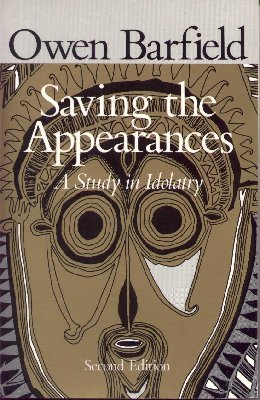
| Prehistory |
"It was during the prehistoric period," Barfield explains in Speaker's Meaning, "that both language and myth developed. Clearly, therefore, the prehistoric period emerged immediately from something we are only justified in calling nature, just as later the historical period emerged immediately from the prehistoric." But here the clarity ceases, for
Barfield seeks to straighten out the incongruity:here too [Barfield goes on to explain], the kind of theory I have been engaged in criticizing in the realm of language and aesthetics [that primitive man "projected" his inner world onto material nature] involves, in the case of history, a sort of leapfrogging movement backwards and forwards at the same time. We are kept on the rails to some extent with the origin of history, because there we have the written records to guide us, however much we may misinterpret them. When we come to the origin of prehistory, then, as far as the psychology of it is concerned, we have mainly speculation. Yet one would have thought that at least we should go on assuming its emergence from nature, and not from the history which only came after it.
Under modern idolatry, we have forgotten that our collective representations (a perceived rainbow for example) is dependent in part upon our participation. Not surprisingly, when we contemplate the past, especially prehistory, we are no less idolatrous, even when we pretend to be scientific. Barfield cautions us to think more logically about our understanding of events that may have taken place independent of human (and perhaps all) perceivers:Nature, as such, involves the absence, just as history as such involves the presence, of individual human activity, as distinct from "instinctive" behavior. But if we maintain (or, if we imagine or suppose, which is perhaps the commoner failing) that such [phenomena as language and myth] are themselves the product of individual human activity, individual human intention, then we are premising, psychologically, that prehistory emerged, not from nature, but a still earlier "historical" period--a suppositious period when existentially individualized human beings, not altogether unlike Julius Caesar, thought and imagined and invented and repressed and suffered from neuroses, and did a whole lot of other things which are in fact only possible in--and really only conceivable of--the historical period. (90-91)
When particles of rain, rays of light and our watching eyes are appropriately disposed, we see a rainbow. In the same way, given the existence, of the particles and the presence of human beings on the earth, there arise collective representations, or in other words the phenomena which we call "nature." When dealing with times in which these conditions were present, therefore, it is quite reasonable to describe and investigate nature scientifically, not only in the manner of physics, but also in the manner of the sciences whose field of study is the past as well as the present, such as geology, ecology, zoology, and to do this as if the phenomena were wholly independent of man's sensory and psychological participation. It is not necessarily misleading to do so, and it has proved to be of great practical use. It is however not sufficiently realized that different considerations apply to any descriptions, in familiar terms, of natural events and processes, deemed to have taken place before the appearance of human life on earth.
- It may of course be contended (though I should
not like the task) that some animals enjoy representations sufficiently
coherent to set up a phenomenal whole, which could be called "a world"
or "nature." But this does not really assist much. For, although animals
appeared on earth before man, it is certainly not their world or nature
which geology, for instance, describes; and even so there remains the whole
vast panorama of prehistory which is assumed to have preceded the emergence
on this planet of sentient life of any description. (SA 37)
In Saving the Appearances, Barfield concludes that "We shall know what we are doing with prehistory, when we have firmly grasped the fact that the phenomenal world arises from the relation between a conscious and an unconscious and that evolution is the story of the changes that relation has undergone and is undergoing" (SA 136).2When attention is expressly directed to the history of the unrepresented (as in calculations of the age of the earth based on radioactivity), it is invariably assumed that the behavior of the unrepresented has remained fundamentally unchanged. Moreover (and this is, to my mind, more important), for those hypothetical "human beings with collective representations characteristic of the last few centuries of western civilization" we might choose to substitute other human beings--those, for instance, who lived one or two or three thousand years ago. We should then have to write a different prehistory altogether. (SA 37)1
| See in particular Worlds Apart; passim, Saving the Appearances, passim. |
| 1A few pages later Barfield resumes this reductio ad absurdum dismantling of our usual thinking on pre-history: "We can adopt a Berkeleyan view of phenomena. For Berkeley held that, not merely the unrepresented, but the representations as such, are sustained by God in the absence of human beings. This wide variety of collective representations which are found even today over the face of the earth, and the still wider variety which history unrolls before us, God has chosen for His delight the particular set shared by Western man in the last few centuries" (SA 38). |
| 2"All that is qualitative in nature," Barfield explains in Worlds Apart, "does depend for its manifestation on our perceiving and thinking. . . . familiar nature depends on something we do to inferred nature--though we do it for the most part unconsciously. However it may have been in the past, it does so depend today. The question whether we can investigate qualities scientifically comes down therefore to the question whether we can investigate this 'doing' scientifically" (140). |